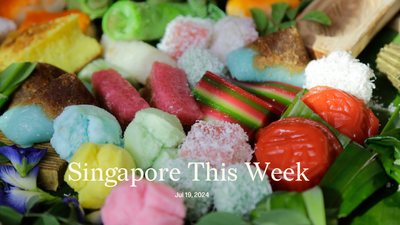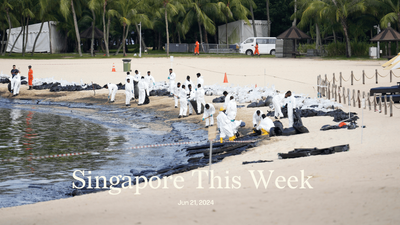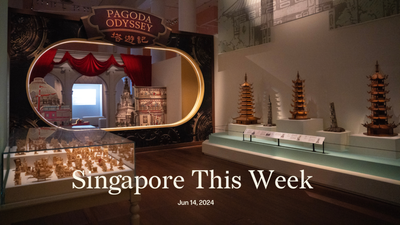Politics: PSP stung again
In early February, Leong Mun Wai, a non-constituency member of Parliament (NCMP) with the Progress Singapore Party (PSP), visited a couple in the West Coast: a 60-year-old man who lost his sight from glaucoma, and a 55-year-old woman who broke her ankle in a fall. He discussed with them the forms of state support they’d been receiving—apparently only a Home Caregiving Grant—and then spoke about their predicament in a Facebook post. For this, he received a correction direction under the Protection from Online Falsehoods and Manipulation Act (POFMA), as did Gutzy Asia and The Online Citizen, who reported on it. The government said that it had actually given the couple numerous benefits and subsidies, including transport vouchers. Leong deleted the post, saying that “accountability is important”, and last week also stepped down as the PSP’s secretary-general, a position he’s held for under a year. He did so voluntarily, the PSP said, seeking to quash rumours about a vote of no confidence. (Fellow NCMP Hazel Poa replaced him.)
The PSP was founded in 2019 by Tan Cheng Bock, a former MP with the ruling People’s Action Party (PAP), who’s since attracted numerous other former establishment folk, notably Lee Hsien Yang, the prime minister’s estranged brother. Political analysts view it as the closest embodiment of a PAP split. Many PAP cadres view Tan and his followers as a bunch of unforgivable turncoats. Almost from the day it was founded the PSP has been plagued by fears about internal saboteurs. Separately, it endured a fracture on the eve of the 2020 general election (GE), when politicians Michelle Lee Juen and Ravi Philemon left it to form Red Dot United. Analysts told CNA that Leong may have resigned to preserve PSP’s reputation as a serious political player. Gillian Koh of the Institute of Policy Studies also pointed to his alleged unparliamentary behaviour. Many Singaporeans actually admire Leong for his willingness to grill PAP ministers on numerous issues, even in the face of shocking, elitist denigrations.
Electorally, all this is important because at GE2020, the PAP narrowly beat a Tan-led PSP team at the West Coast Group Representation Constituency. Since then, the PAP team has suffered the ignominy of losing its main minister, S Iswaran, to a corruption scandal. This has boosted the hopes of the PSP in what’s expected to be a key contest at the next GE, due by November 2025. Will Leong’s failure to verify stories from the most vulnerable in society dampen his fans’ enthusiasm for him?
Some further reading: Jom’s “Q&A with Leong Mun Wai of the Progress Singapore Party”
Society: The Ministry of Truth will teach your kids about Palestine
“A better solution to resolving conflicts/disagreement: The situation in Israel and Gaza”. This was the grandiose title of a Character and Citizenship Education (CCE) lesson by Singapore’s Ministry of Education (MOE), which has come under fire from parents. “Do we let them grapple with external influences on their own? Should we risk letting them be misguided by biased sources on social media?” asked Chan Chun Sing, education minister, in justifying MOE’s decision to cobble together content from the Ministry of Foreign Affairs and others into a bizarre mix of current affairs, emotional therapy, and playground make-believe. “Some may have seen only part of the material, and came to the wrong conclusion, that the CCE lesson is meant to cast one side as good, or the other side as evil. But that is precisely what we are trying to avoid.”
Too bad, Chan: MOE failed, in our assessment. Parents were right to complain. Yes, the slide deck says early on that this is “...a longstanding feud going back at least decades, if not centuries, involving multiple state and non-state actors.” But it then goes on to present a skewed narrative, perhaps unintended, perhaps the product of implicit bias. A timeline plots events only from the October 7th terror attacks. They’re not designed to be history lessons, Chan said. But when to begin and what to leave out are interpretive choices: Jom has previously criticised a separate ahistorical approach of Bilahari Kausikan, chairman of Singapore’s Middle East Institute. The attacks are shown in the CCE lessons as a casus belli for Israel’s retaliation, which is also presented in fairly benign terms—no mention of the horrific death toll, possible human rights abuses, and other excesses that have since led to the calls for a ceasefire (and accusations of genocide internationally). Moreover, with the CCE’s focus on Gaza, Hamas comes across as the only representative of the Palestinians—a child with no knowledge of, say, Fatah, other Gazans, and the West Bank, might leave with the idea that there are no moderate, peace-loving Palestinians. Similarly, because MOE’s framing precludes any mention of Israeli settlers and terrorists, the concept of terror in this conflict may seem, to kids, like the preserve of Palestinians.
MOE, Chan, and teachers were well-intentioned in their efforts to “...prevent external events from affecting our harmony”, as a succession of multiple-choice questions makes clear. Yet this episode shows the limits of Singapore’s top-down approach to education, more glaring with an immensely complex international issue for which public discourse has been curtailed. Singaporean maths textbooks have been flying off shelves around the world. We shouldn’t expect our “character” curriculums to be as popular.
Society: Singapore chopes Taylor Swift
We’re in our kia su (“scared to lose”) era. After Srettha Thavisin, Thailand’s prime minister, claimed that Singapore prevented Taylor Swift from performing elsewhere in South-east Asia by offering subsidies of US$2-3m (S$3-4m) per show as part of an exclusivity agreement, the Singapore Tourism Board and the Ministry of Culture, Community and Youth confirmed as much in a joint statement (without specifying the size of the subsidy). Representatives from Kallang Alive Sport Management (KASM), a subsidiary of a firm incorporated by Sport Singapore, wooed Swift and concert promoter Anschutz Entertainment Group in early 2023, before the popstar released international dates for her record-breaking, billion-dollar earning “Eras Tour”. Soon after, KASM roped in other government agencies to “have Team Singapore [bring] in Team Taylor”.
The six sold-out shows for 300,000 people are expected to stimulate our economy by over S$96m, aside from the undoubted boost to Singapore’s international branding and positioning as a leading entertainment destination. Although it’s not uncommon for cities to offer financial incentives in exchange for exclusivity to host major events, news of this deal has caused some regional consternation. Some frustrated international fans called Swift a “capitalist” and “opportunist”. Others were disappointed in Singapore. “[The exclusivity deal] runs contrary to the principle of consensus-based relations and solidarity on which ASEAN was founded,” said Joey Salceda, who serves on the Philippine House of Representatives. “I don’t think we should just let things like this pass. We should still officially register our opposition.” Before Thavisin revealed the exclusivity clause, keywords associated with Swift in online spaces included “love”, “winning” and “concert”. After the news broke, discussions turned to “coup”, “deal” and “tourists”.
Forward thinking and shrewd? Or underhanded and selfish? Whatever the case, Singapore can expect fierce competition from other countries for the next big act. Thailand will do more to attract “A-listers and world-class acts”, said Thavisin; Hong Kong’s leader John Lee Ka-chiu said that they will be “relentless” in its efforts to entice mega events; and Indonesia has put together a 1tn rupiah (S$86m) tourism fund to lure artistes. Some Swifties in Singapore are annoyed about the competition for tickets they’ve faced from regional Swifties for a show in their own country, while others have felt a bit of shame in line with Salceda’s comments. Even so, those with tickets will be wrapped in a sweet “Lavender Haze” for the next week.
Society: Better education and finances, better parents?
Parenting behaviours affect early childhood development, but so do the availability, or lack thereof, of cognitive, psychological and socioeconomic resources. Researchers at the National University of Singapore (NUS) have found that factors such as a primary caregiver’s verbal cognitive ability, their capacity to exercise self-control, and their levels of economic stress, were critical in predicting child internalising problems (including withdrawal, anxiety and depression) and thus emotional resilience and self-regulation (eg. delayed gratification). Living arrangements and a parent’s education level also influence a child’s mental well-being. Dr Chen Luxi from the Human Potential Translational Research Programme at NUS’s Yong Loo Lin School of Medicine, who co-led the research, explained that parents who were better educated, with stronger self-control and with less financial worries tend to use more functional—as opposed to punitive—strategies to interact with and discipline their children. Instead of harsh punishment (negative parental control), they set clear rules, which are enforced with guidance, discussions and encouragement (positive parental control).
But the lack of privilege isn’t necessarily a deal breaker. “Parents, regardless of their educational and financial backgrounds, can practise self-control…such as managing their own emotions, breaking bad habits…Functional parenting strategies can be learned and trained,” Chen told TODAY. Other factors in nurturing emotional resilience include the child’s socio-ecological system, such as neighbourhood safety, and social support within the broader community. The paper’s authors believe this is the first longitudinal study that uses “a large, nationally representative and socioeconomically and ethnically diverse sample of young children in Asia to investigate the complex mechanism regarding how diverse environmental and child-level resources influence children’s internalising symptoms.” They collected data from 2,619 children aged three to six and their primary caregivers (95.1 percent mothers), first in 2018-19, and again in 2021.
This study comes amidst the surge in mental health issues among young Singaporeans. Last year, research showed that one in three adolescents (10-18 years) reported distress, while only one in 10 parents observed signs of it in their children. Experts have recommended that parents carve out playtime with their offspring; develop a trusting and supportive relationship with kids from the time they’re young; and raise children in a physically affectionate household, allowing for failure and mistakes. All this is well and good, but given the myriad stresses of post-pandemic life—job security and the rising cost of living, to name a few—it’ll take more than rainbows and unicorns to shape an environment where Singaporeans can be their best parent-selves.
History weekly by Faris Joraimi
One of Singapore’s grand old men of Malay letters, Cikgu (“teacher”) Suratman Markasan passed away last Tuesday at the age of 94. Born in 1930, Suratman participated in important historical developments in Malay literature and social life. After attending Malay schools in Singapore, he enrolled in Sultan Idris Training College (SITC): initially a vocational tertiary school for Malay commoners, it ended up producing a generation of anti-colonial intellectuals. With a teaching certificate from SITC, Suratman became an educator at a time when Singapore’s Malay teachers and journalists were an organised political force who actively responded to current affairs. He was both a member of the Singapore Malay Teachers’ Union and headed Angkatan Sasterawan ‘50 (ASAS ‘50; The League of Writers ‘50), the first and oldest postwar literary association in Malaya. Socialist in outlook, ASAS ‘50 was modelled after Indonesia’s Lembaga Kebudayaan Rakyat (LEKRA; People’s Culture Institute) and its vision of “art for society”. (Pramoedya Ananta Toer, Indonesian novelist, had been a prominent member of LEKRA.)
Meanwhile, ASAS ‘50 included other famous Malay literati such as Usman Awang, Keris Mas and Mohamed Latiff Mohamed. Of this pioneering group, Suratman was the last surviving member. In 1971, he graduated from Nanyang University (Nantah) in Malay and Indonesian studies. During these post-Malaysia years, Suratman wrote stirring poems that captured the condition of Malays living under racial marginalisation and nation-making projects that displaced their old ways of life. He penned Balada Seorang Lelaki Di Depan Patung Raffles (“Ballad of a Man in front of the Raffles Statue”) where a madman rails against the silent colonial figure. In Jalan Permulaan (The Road of Beginnings), he wrote of how “The sea where I caught fish / The hill where I searched for rambutans / Have been overgrown by brick and stone”. He was awarded the Cultural Medallion in 2010. Despite the bleakness of some of his works, they contain a recurrent call for justice. As a religious man, he advocated the reform of Muslim institutions. Perhaps most relevant for our times is a performance, in 2014, of his poem Gaza Berdarah Kembali (“Gaza Bleeds Again”) at a Hong Lim Park event “Speak Love, Not Hurt - In Solidarity with Gaza”. As a big tree falls, light and space are made for others to take root. These lines from Jalan Permulaan ring in my ear: di sini anak-anakku membesar / seperti paya terus melebar. “Here my children grow, like a swamp that keeps widening.”
Arts: Timeout for Times Bookstores
With the closure of its Plaza Singapura and Waterway Point branches, Times Bookstores has just one remaining store, in Jelita Shopping Centre along Holland Road. The countdown clock of Times’s operations spanned several years. They first bid farewell to Centrepoint in 2019, then Marina Square and Paragon in 2021, and have also wound up several branches in Malaysia. Times is owned by food and beverage conglomerate F&N, and perhaps most closely resembles the innocuous airport bookstore: inoffensive but interchangeable in its stock of souvenirs, snacks, and generic bestsellers. This ubiquity, formerly a strength, may now prove to be its downfall. Might it be a matter of time before Times goes the way of MPH and Borders?
Two of the remaining large chains are Books Kinokuniya and Popular, but even these household names aren’t immune to a small reading public, dwindling sales, soaring rent and rising printing costs. The recent GST hike has also left booksellers split on strategies. Absorb the increase, or pass it on to readers? Each poses a different problem. In this densely interdependent literary ecosystem, every economic decision sends reverberations further down the line, from author to publisher to bookseller to public and back again. The perpetual rise in costs of living, coupled with shifting pre- and post-pandemic reading habits, haven’t been kind to brick-and-mortar bookstores and publishers.
However, William Phuan, executive director of the Singapore Book Council, told The Straits Times that “bright spots” remain in the community-building and place-making commitments of indie and specialty bookstores that have chosen to woo and cultivate specific reading demographics. These include Woods in the Books (picture books), Basheer Graphic Books (art and design), Wardah Books (books on Islam), and City Book Room (Chinese-language texts). Some, like Grassroots Book Room and Book Bar, have integrated F&B offerings into their spaces, alongside championing local literature and playing host to cosy, in-person literary events, from book launches to themed reading groups. The annual Singapore Art Book Fair—known for hard-to-find publications from an eclectic range of local and international exhibitors—boasts sneaking queues and 6,500 visitors over a single weekend. But numbers only tell half the story, and Ethos Books had to let go of half their staff at the end of last year. Still, the beloved publisher is determined to find a different way forward. Perhaps it’s the persistence of booksellers and stores that host people, and not just push products, that are a sign of the times.
Arts: ‘Living well and leaving well’, an art exhibition by seniors for seniors
“I’ve looked at life from both sides now,” Joni Mitchell’s delicate mezzo-soprano lingers over the final stanza of one of her most well-loved songs. Like the existential ballad, “Both Sides, Now”—an arts-based community development programme by non-profit ArtsWok Collaborative—wonders if we really know life at all, particularly when we near its end. Since 2013, this long-term programme has encouraged conversations around end-of-life issues, from caregiving to advance care planning, through various art projects and performances. Originally commissioned by Lien Foundation and Ang Chin Moh Foundation, and co-presented by theatre company Drama Box, the programme has consistently sought to normalise discussions around a topic typically considered pantang or taboo. “Both Sides, Now” tends to spend substantial periods of time with specific communities, instead of parachuting in and out, so that these engagements gain traction.
For this year’s edition, subtitled “tides 潮”, ArtsWok has partnered with healthcare network Yishun Health. They’ve also invited socially engaged artist Salty Xi Jie Ng to embed herself with Wellness Kampung @ 765 Nee Soon Central—since last June she’s collaborated with eight elderly Yishunites to co-create a whole array of short films, exhibitions and conversations. Two of the women have since set up a “Single Seniors Club” to support seniors living alone, so that they don’t end up dying alone. Another’s created mixed media sculptures inspired by her daughters’ umbilical cords, signifying their physical and emotional mother-daughter bond. You’ll get to see these installations and participate in conversations and tours led by these seniors from March 9th to 20th. ArtsWok is celebrating its 10th anniversary this year, and hopes to share and exchange accumulated knowledge about community-based arts in Singapore through their Learning Forum at the end of this month. End-of-life care is just one of many complex topics that ArtsWok hasn’t shied away from tackling; their other flagship programme is the M1 Peer Pleasure Youth Theatre Festival, where they’ve interrogated structures of poverty and attitudes towards disability in Singapore through shows for teens. From this side, it isn’t the dying that’s hard—it’s the living that takes work.
Some further reading: “Salty Xi Jie Ng seeks to provoke”, Jom’s profile of the artist.
Tech: How not to grow
Singapore-based fintech firm DCS Card Centre made headlines last month after several customers reported issues with unexpected payment changes and a lack of support. The problems stem from DCS’s ambitious plans over the past year to move beyond credit cards and develop a full-service fintech platform. As part of this strategy, the company revised card repayment schedules and annual fees in October. However, many cardholders claimed to have received little advance notice of the changes, resulting in unexpected late fees. Frustrations were compounded by an unresponsive customer service team as call and e-mail volumes surged. DCS has attributed the service gaps to a rapid 20 percent monthly user growth between July and December 2023, which overwhelmed resources. Compared to a year ago, the fintech firm likely handles twice the number of cardholders. DCS’s new self-service features on its app and additional recruitment don’t seem to have helped enough.
All this highlights the risks associated with disruptive changes during transitions. Growing too quickly can strain infrastructure if customer needs are not adequately addressed. DCS’s transformation plan involves goals such as doubling its market share here by 2025 and breaking even by 2026. It has also hired Tin Pei Ling, a PAP member of Parliament, to head up strategic partnerships and business development. But rebuilding customer trust after a bumpy period may prove difficult without demonstrable service improvements. For fintechs transforming their business models, change management and scalable support are as vital as product innovation. Growing pains that impact users could undermine long-term goals if not properly managed throughout disruption.
Tech: Buyback time for Grab’s shareholders
South-east Asia’s largest super app Grab delivered its first-ever quarterly profit in Q4 2023, posting US$11m (S$14.7m) in profit versus a US$391m (S$525.7m) loss in the same period last year. This significant turnaround demonstrates progress on Grab’s path to profitability. Revenue climbed 30 percent quarter on quarter and 65 percent year on year to US$2.36bn for 2023. Grab has attributed the growth to strength across deliveries, mobility and other segments. Grab’s board also approved a US$500m (S$672m) share repurchase programme of Class A ordinary shares over the next two years. A share repurchase is commonly seen as a sign of confidence in a stock’s near-term price potential. Peter Oey, Grab CFO, highlighted the company’s “robust balance sheet” following the recent profitability milestone. In 2024, management expects continued adjusted EBITDA (earnings before interest, taxes, depreciation and amortisation) and cash flow improvements through strategic execution. However, regulatory scrutiny remains—the Competition and Consumer Commission of Singapore has launched a review of Grab’s proposed Trans-Cab acquisition. Talks to buy foodpanda SEA from Delivery Hero have also ended. That Grab has hit its profit milestones in a challenging year, amid macro headwinds, is validation of its super app model as it strives for dominance across South-east Asia. Hopefully, these windfalls one day benefit not just its shareholders, but its riders too.
If you enjoy Jom’s work, do get a paid subscription today to support independent journalism in Singapore.







